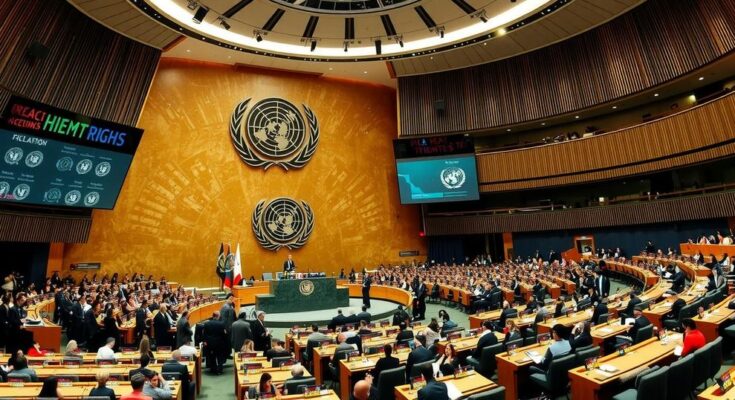In a resounding show of support, over 100 countries at the UN General Assembly defended China’s position against the politicization of human rights. Ambassador Fu Cong rejected Western accusations, emphasizing that urgent human rights crises include situations in Gaza. A collective stance emerged, advocating respect for national sovereignty and criticizing unilateral coercive measures.
At the UN General Assembly’s Third Committee meeting in New York, over 100 nations rallied behind China, denouncing the politicization of human rights. Ambassador Fu Cong firmly rejected allegations from certain Western countries, noting that the human rights crises needing urgent attention include those in Gaza. This broad support for China highlights a collective pushback against Western political maneuvering disguised as human rights advocacy. Pakistan conveyed a joint message representing 80 nations, emphasizing that issues pertaining to Xinjiang and Xizang fall under China’s domestic affairs. They condemned interference from foreign nations and called for adherence to the fundamental principles set forth in the UN Charter, advocating respect for each state’s right to pursue its own development path. Additionally, over 20 countries voiced their alignment with China, opposing double standards and the politicization of human rights. Ambassador Fu, on behalf of 28 nations, criticized the unilateral coercive measures imposed by Western countries, indicating such actions contravene international law. He urged for the immediate repeal of these measures, which he argued infringed upon the basic rights of affected populations. The Third Committee serves as a vital forum for addressing human rights and social progress issues. Since 2019, the United States and a few allied powers have persistently leveraged human rights discussions to undermine China. However, the overwhelming response from numerous countries reiterates a strong resistance against this narrative, signaling the ineffectiveness of such tactics.
The discussion surrounding human rights at the UN has become a contentious battlefield, particularly as Western nations have increasingly criticized China’s human rights record. China, in turn, defends its policies, asserting its stance is grounded in the legitimate interests and sovereignty of nations. This current wave of support from over 100 countries signifies a shifting dynamic in international relations, with a strong emphasis on sovereignty and non-interference in domestic affairs becoming central themes in the conversation.
The UN General Assembly’s recent session reflects a significant stand by over 100 countries opposing Western attempts to politicize human rights issues against China. This position underscores a collective desire for respecting national sovereignty and discouraging external interferences. The call against unilateral sanctions further emphasizes the need for cooperative international relations based on mutual respect, highlighting that attempts to manipulate human rights concerns for political ends have largely failed.
Original Source: news.cgtn.com



